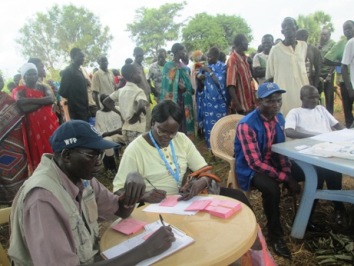Refugee group sounds alarm bell over humanitarian situation in S. Sudan
March 15, 2015 (WASHINGTON) – Refugees International (RI) has warned of the dire humanitarian situation in the war-ravaged South Sudan unless donors scale up the humanitarian response ahead of the rainy season and the expected more displacement of civilian population in the country.

“With the rainy season approaching hundreds of thousands of displaced people will be almost impossible to reach. This is why it is so important that donors continue to provide the financial support needed to make sure all that can be done is being done to get that aid to those who need it so desperately,” said RI Senior Advocate, Mark Yarnell.
The report calls upon the peacekeepers under the mandate of the United Nations Mission in South Sudan (UNMISS) and humanitarians to better understand the needs of displaced people living on Protection of Civilians (PoC) sites, as well as the threats they face outside, warning that failing to do so could prevent people from seeking the UN’s protection, or even put them in harm’s way.
It also calls on 12,000 UNMISS force to robustly respond to threats against civilians outside its bases.
“UNMISS has sheltered vulnerable South Sudanese for more than a year, something it never planned or expected to do. That is tremendously important and must continue,” said RI Advocate Michael Boyce.
The report however criticized UNMISS for doing little to protect civilians outside their bases in failure to prosecute its task as demanded by its chapter seven mandate which emanated from the United Nations Security Council (UNSC) resolutions.
However, the report cited challenges posed by the two warring parties in South Sudan, making UNMISS operations impossible in many instances.
The findings accused government troops of the Sudan People’s Liberation Army (SPLA) and South Sudan National Police Service (SSNPS) of violating the Status of Forces Agreement (SOFA) on a regular basis, thereby limiting the movement of UNMISS.
It says because of repeated interference by the SPLA and SSNPS, UNMISS is unable to carry out night patrols in the capital, Juba.
The report challenged UNMISS to not only protect the 11,000 civilians within its compounds but also to go out and protect hundreds of thousands other vulnerable civilians in towns and villages as well as respond to violations by the warring parties.
“However, UNMISS’s protection role does not stop at the gates of its bases. Where UNMISS is able to move into towns and villages, it must show a willingness to do so. And if South Sudan’s warring parties keep trying to stop them, donor governments and the Security Council must respond,” it says.
The conflict which started in mid-December 2013 between president Salva Kiir’s government and opposition forces led by former vice president, Riek Machar, has forced 2 million people from their homes, including 1.5 million people displaced internally.
Talks aimed to end the nearly 15-month old conflict collapsed on 6 March but are expected to resume in April in Addis Ababa under a new IGAD-plus expanded mediation that would include countries of Troika, United Nations, and African Union.
Fighting has however continued in Upper Nile region, home of the rebel leader, Riek Machar, with more violence feared beyond the region before the rainy season.
(ST)
